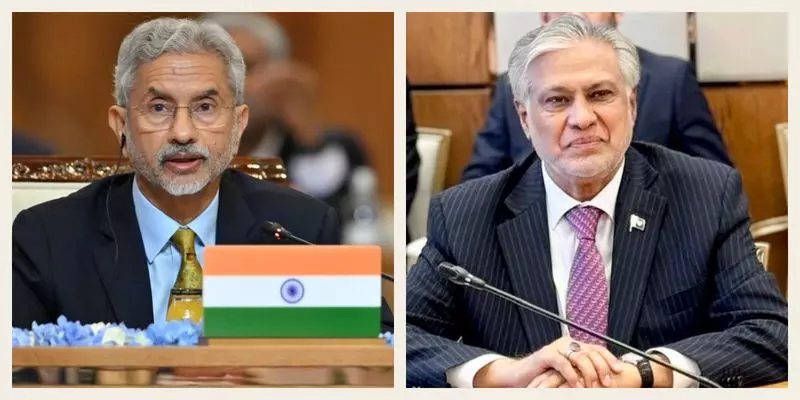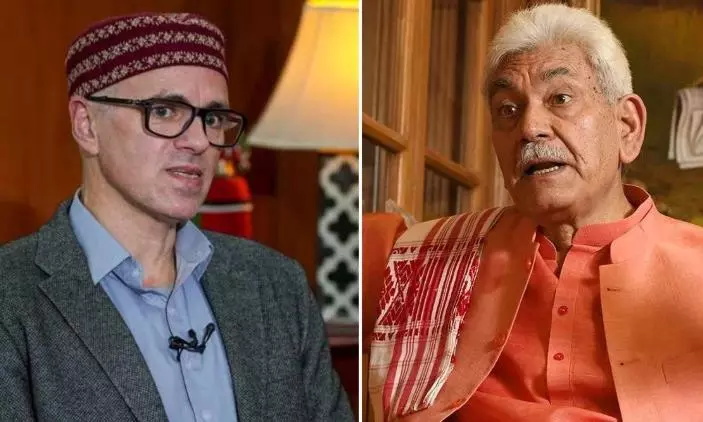
India, Pakistan spar at SCO meet over terror, Operation Sindoor
text_fieldsNew Delhi: In a rare and tense diplomatic encounter since their latest military confrontation, the foreign ministers of India and Pakistan shared the stage at the Shanghai Cooperation Organisation (SCO) summit in Tianjin. Although both refrained from naming each other directly, their statements were clearly coloured by the recent Pahalgam terror attack and the subsequent four-day military exchange, including Operation Sindoor and the use of drones and missiles.
During the SCO Foreign Ministers’ Meeting on July 15, India’s External Affairs Minister S. Jaishankar strongly defended the country’s cross-border strikes in response to the Pahalgam incident. He urged SCO members to adopt an “uncompromising” stance against terrorism, describing the attack as a deliberate attempt to damage Jammu and Kashmir’s tourism economy and fuel religious division. Citing the United Nations Security Council (UNSC)’s condemnation of the attack, he reiterated that the perpetrators, organisers, financiers, and sponsors must be held accountable — a principle India has cited to justify Operation Sindoor.
“The UN Security Council, of which some of us are currently members, issued a statement that condemned it in the strongest terms and underlined the need to hold perpetrators, organisers, financiers and sponsors of this reprehensible act of terrorism accountable and bring them to justice. We have since done exactly that and will continue doing so,” Jaishankar said.
Three SCO members — Russia and China as permanent members, and Pakistan as a non-permanent member — currently sit on the UNSC.
Jaishankar reminded fellow ministers that the SCO was originally founded to counter terrorism, separatism, and extremism. He stressed that the grouping must stay true to these founding principles and take a firm stance on such issues. He further noted that SCO’s effectiveness as a regional platform depended on its ability to pursue a shared agenda through inclusive cooperation. “That means taking everybody on board,” he remarked.
His comments came just a day after his visit to Beijing, where he held bilateral talks with senior Chinese officials — marking the first visit by an Indian foreign minister to China in five years. The trip signalled a gradual thaw in relations following the resolution of the military standoff along the Line of Actual Control.
Meanwhile, Pakistan’s Deputy Prime Minister and Foreign Minister Ishaq Dar also addressed the forum, criticising what he described as the premature attribution of blame for the Pahalgam attack. Without directly naming India, Dar said such actions, taken “without a credible investigation or verifiable evidence,” had pushed the region to the brink of serious conflict. He reaffirmed Pakistan’s commitment to the ceasefire but cautioned against the normalisation of the arbitrary use of force.
India, however, has consistently referred to the arrangement not as a ceasefire but a “cessation of hostilities,” and has denied any role by external actors in reaching it. While U.S. President Donald Trump claimed to have brokered the agreement, India maintains that it was the outcome of direct military-to-military communication.
Dar further stressed that regional peace could only be achieved through sustained dialogue and adherence to bilateral agreements. “Strict adherence to bilateral agreements would be equally important in this regard,” he said. In a significant move following the Pahalgam attack, India had announced that it was placing the 1960 Indus Waters Treaty — which governs water-sharing between the two countries — “in abeyance”.
“The events unfolding since April 22 reaffirm a central truth of South Asian geopolitics: the peaceful settlement of longstanding disputes is imperative for enduring peace in the region,” Dar added.
Beyond the India-Pakistan exchange, Jaishankar also addressed the situation in Afghanistan, calling on SCO members to enhance development assistance, with India pledging its support. He also highlighted the pressing need to remove barriers that hinder regional trade and transit.
“One of them is the lack of assured transit within the SCO space. Its absence undermines the seriousness of advocating cooperation in economic areas,” Jaishankar said, while expressing India’s support for the International North South Transport Corridor, which it hopes will gain traction.
Jaishankar noted that the meeting took place amid “considerable disorder” in the global system, marked by escalating conflict, coercion, and economic instability. The collective responsibility of the SCO, he said, was to stabilise the international order and mitigate shared risks while working to address common challenges.
A statement released by the SCO Secretariat confirmed that the foreign ministers focused on finalising outcome documents for the upcoming SCO Leaders’ Summit in autumn. Prime Minister Narendra Modi is expected to travel to China for the summit.
However, consistent with recent precedent, no joint statement was issued at the conclusion of the foreign ministers’ meeting. Last month, India had blocked a similar statement after the SCO Defence Ministers’ Meeting, citing the failure to address New Delhi’s concerns over Pakistan-sponsored cross-border terrorism.









